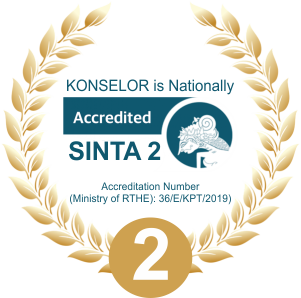The Influence of Generations on Career Choice (Social Cognitive Career Theory Perspective)
 ),
), (1) Universitas Negeri Yogyakarta
 Corresponding Author
Corresponding Author
Copyright (c) 2018 Galuh Prawitasari
DOI : https://doi.org/10.24036/02018718464-0-00
Full Text:
 Language : en
Language : en
Abstract
Keywords
References
Adams, S. J. (2000). Generation X: how understanding this population leads to better safety programs. Professional Safety, Vol. 45, pp. 26-9.
Bradford, F.W. (1993). Understanding ‘Generation X. Marketing Research, Vol. 5, p. 54.
Buhane, A. K., & Kovary, G. (2003). The road to performance success: Understanding and managing the generational divide. Ngen Performance. Retrieved from http://www.ngenperformance.com/pdf/white/ManagingGenDivide.Overview.pdf
Dose, J. (1997). Work values: an integrative framework and illustrative application to organizational socialization. Journal of Occupational and Organizational Psychology, Vol. 70, pp. 219-41.
Gibson, R. (2013, March 20). Definition of Generation Y. Generation Y. Retrieved from http://www.generationy.com/definition/
Grimes, G. (2011, May 23). How Generation X works. Howstuffworks.com. Retrieved from http://people.howstuffworks.com/culture-traditions/generation-gaps/generation-x.htm
Herman, A., & Eckel, R. (2002). The new American worker: what Generation ‘Y’ brings to the workplace. Work Matters, May, pp. 1-2.
Judge, T. A., & Bretz, J. D. (1992). Effects of work values on job choice decisions. Journal of Applied Psychology, Vol. 77, pp. 261-71.
Jurkiewicz, C. E. (2000). Generation X and the public employee. Public Personnel Management, Vol. 29, pp. 55-74.
Jurkiewicz, C.E., & Brown, R.G. (1998). GenXers vs Boomers vs Matures: generational comparisons of public employee motivation. Review of Public Personnel Administration, Vol. 18, pp. 18-37.
Karp, H., Sirias, D., & Arnold, K. (1999). Teams: why Generation X marks the spot. The Journal for Quality and Participation, Vol. 22, pp. 30-3.
Kidd, J. M. (2006). Understanding Career Counseling: Theory, Reserach, and Practice. London: Sage Publications.
Kupperschmidt, B. R. (2000). Multigeneration employees: strategies for effective management. The Health Care Manager, Vol. 19, pp. 65-76.
Leibow, C. (2014, October 16). Work/life balance for the generations. Huff Post Business. Retrieved from http://www.huffingtonpost.com/cathy-leibow/worklife-balance-for-the-_1_b_5992766.html
Menzies, D. (2014, August 14.). Generation Z: The digital natives. The Official Home of Dave Menzies. Retrieved from http://davemenzies.com/digital-marketing-2/generation-z-digital-natives/
O’Bannon, G. (2001). Managing our future: the Generation X factor. Public Personnel Management, Vol. 30, pp. 95-109.
Regulation of the Minister of Education and Culture of the Republic of Indonesia Number 111/2014
Renfro, A. (2012, December 5). Meet Generation Z. Getting Smart. Retrieved from http://gettingsmart.com/2012/12/meet -generation-z/
Schroer, W. J. (2008, March/April). Generations X, Y, Z and the others. The Portal, 40, 9. Retrieved from http://iam.files.cms-plus.com/newimages/portalpdfs/2008_03_04.pdf
Sonnenberg, D. (1997). The ‘new career’ changes: understanding and managing anxiety. British Journal of Guidance & Counselling, Vol. 25, pp. 463-72.
Smola, K.W., & Sutton, C.D. (2002). Generational differences: revisiting generational work values for the new millennium. Journal of Organizational Behavior, Vol. 23, pp. 363-82.
Stevens, R. H. (2010). Managing human capital: How to use knowledge management to transfer knowledge in today’s multigenerational workforce. International Business Research, 3(3), 77-83.
Swanbrow, D. (2012, October 23). The Generation X Report: How many Gen Xers know their cosmic address? Michigan News:University of Michigan. Retrieved from: http:// www.ns.umich.edu/new/releases/20908-the-generation-x-report-how-many-gen-xers-know-their-cosmic-address
Westerman, J.W., & Yamamura, J.H. (2007). Generational Preferences for Work Environment Fit: Effects on Employee Outcomes. Career Development International Vol. 12 No. 2, 2007, pp. 150-161
Wiedmer, Terry. (2016). Generations Do Differ: Best Practices in Leading Traditionalists, Boomers, and Generations X, Y, and Z. The Delta Kappa Gamma Bulletin: International Journal for Professional Educators.
 Article Metrics
Article Metrics
 Abstract Views : 4578 times
Abstract Views : 4578 times
 PDF Downloaded : 1117 times
PDF Downloaded : 1117 times
Refbacks
- There are currently no refbacks.
Copyright (c) 2018 Galuh Prawitasari

This work is licensed under a Creative Commons Attribution 4.0 International License.







